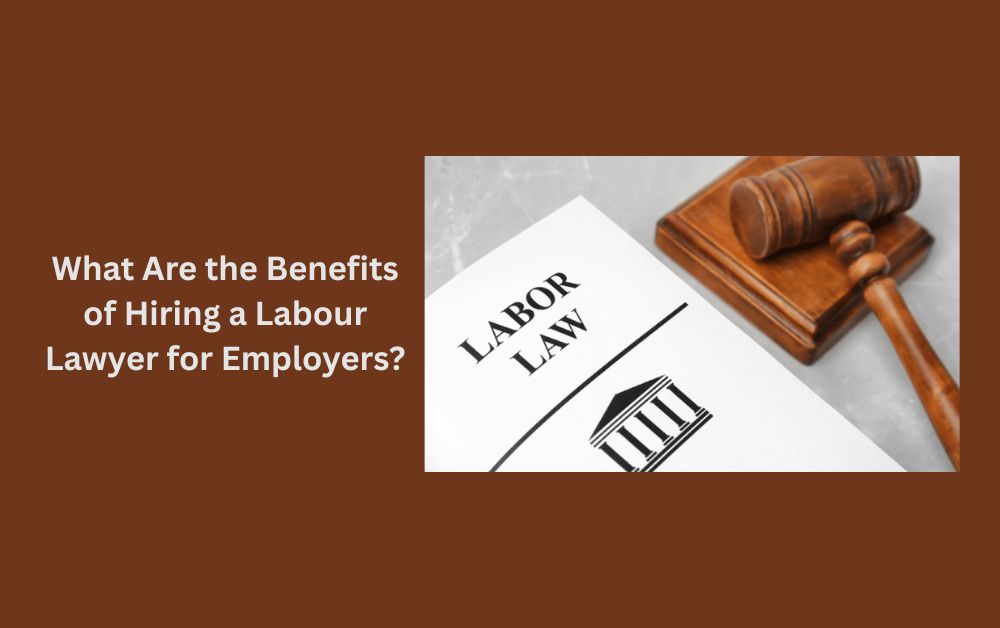
What Are the Benefits of Hiring a Labour Lawyer for Employers?
- Book My Author
- Business
- 2025-09-19 14:13:59
- 798K
Running a business means dealing with people — and when people work for you, problems can happen. A labour lawyer helps employers handle those problems correctly and fairly. This guide explains, in simple words, why hiring a labour lawyer is usually a smart move for any employer. The headings are expanded and clear so anyone can read and understand.
Quick overview — what this article covers and why it matters
This article explains:
- What a labour lawyer does for employers.
- Key benefits of hiring one, with easy examples.
- How a labour lawyer can save money and stress.
- How to choose the right lawyer and what to ask.
If you want to protect your business and treat staff fairly, this article will help you see why a labour lawyer is useful.
What is a labour lawyer? — short, clear explanation
A simple definition
A labour lawyer is a legal expert who knows the rules about work and jobs. These rules include things like pay, working hours, leave, hiring, firing, and health and safety. Labour lawyers use the law to help both employers and workers. In this article, we focus on how labour lawyers help employers.
What a labour lawyer can do
A labour lawyer can:
- Read and write employment contracts.
- Help make workplace rules and policies.
- Give advice to stop problems before they start.
- Handle complaints from workers.
- Represent the employer in court or at a labour tribunal.
These tasks help businesses run more smoothly and avoid costly mistakes.
Note:- Protect your business and avoid costly legal issues by consulting a trusted Labour Lawyer today. Get expert advice tailored to your company’s needs and stay compliant with the law.

Benefit 1 — reduce the chance of legal trouble
Why legal trouble is costly
If you break employment laws, you can face fines, payback to workers, or long legal battles. These costs are not just money — they also cost time, attention, and your company’s reputation.
How a labour lawyer lowers risk
A labour lawyer checks your contracts and policies. They make sure your documents follow the law and are clear. When rules are clear, workers know what to expect and misunderstandings drop.
Example: clear job contracts prevent fights
If a contract clearly says the working hours, pay, and notice period, an employee cannot later claim something different. This clarity makes disputes less likely.
Benefit 2 — save money in the long run
Legal fees vs. big fines or payouts
A lawyer costs money. But legal mistakes can cost much more. A single employment claim can lead to large payouts or long court fees. A labour lawyer helps prevent these expensive problems.
Small investment, big savings
Fixing a problem before it becomes a claim is usually cheaper than fighting a claim later. Lawyers help spot weak points in contracts or policies early.
Example: fixing policy language
A lawyer might change the wording in a termination policy. That small change can stop a fired employee from winning a big payout.
Benefit 3 — handle complex laws and keep up with changes
Laws change often
Work rules and labour laws change from time to time. These changes are hard to follow if you are busy running a business.
Lawyers track changes
Labour lawyers follow the law all the time. They tell you what has changed and what you must do. This keeps your business up to date and legal.
Example: new leave rules
If the law adds a new type of leave or changes how wages are calculated, your lawyer can update your contracts and payroll process so you stay compliant.
Benefit 4 — help with difficult staffing decisions
Firing and layoffs are sensitive
Ending an employee’s job is one of the hardest parts of running a business. If done wrongly, it leads to claims of unfair dismissal.
Lawyers guide fair and legal steps
A labour lawyer advises on the correct steps: warning letters, performance plans, consultations, and notice periods. They help document everything so the employer has a clear record.
Step-by-step help
- Review the facts.
- Suggest fair steps (warnings, meetings).
- Prepare letters and records.
- Guide the final decision and paperwork.
This step-by-step help lowers the chance of a later legal claim.
Benefit 5 — resolve disputes faster and peacefully
Disputes waste time and energy
When an employee has a complaint, it can distract you and the team. If it goes to court, it can take months.
Lawyers use negotiation and mediation
A labour lawyer can try to solve the problem outside court. They use negotiation or mediation, which is usually faster and cheaper than going to a judge.
Good for relationships
Mediation can keep trust between employer and worker. This is useful if you want the employee to leave on good terms or stay in the business.
Benefit 6 — create clear workplace policies and contracts (H2)
Good policies set the tone
Policies on leave, discipline, anti-harassment, and remote work make rules clear. Clear rules help managers act fairly.
Lawyers write strong, simple policies
A lawyer writes policies that are short, simple, and clear. They use plain language so everyone can understand.
Example: anti-harassment policy
A clear anti-harassment policy explains what behavior is not allowed, how to report it, and what will happen next. A lawyer ensures this policy meets legal standards.
Benefit 7 — protect your business reputation
Public disputes hurt business
When employment disputes go public, customers and partners notice. Bad press can damage your brand.
Lawyers reduce public risk
By resolving matters privately and quickly, a lawyer helps keep problems out of the news. Good legal advice can also reduce risky statements that could hurt the company publicly.
Example: careful communication
Before sending a public message about a staff issue, a lawyer can check the wording to avoid legal harm.
Benefit 8 — help with audits and inspections
Government checks happen
Labour inspectors can visit workplaces to check rules are followed. If they find problems, they can fine or order fixes.
Lawyers prepare you and respond
A labour lawyer can prepare for an inspection and help answer questions. If inspectors find issues, the lawyer helps fix those issues and argue for fair treatment.
Example: payroll audit
If a payroll audit looks at overtime payments, a lawyer can show records and explain how the business calculates pay to avoid fines.
How to choose the right labour lawyer — simple steps
Step 1: look for experience with employers
Choose a lawyer who works with businesses, not only with workers. Employer-side experience matters.
Step 2: ask for plain-language advice
You want a lawyer who explains things in simple words. Avoid lawyers who use too much legal talk.
Step 3: check fees and value
Ask how they charge: hourly, fixed fee, or retainer. Choose clear pricing that fits your budget.
Step 4: ask for references or examples
Ask for short examples of similar cases they handled. This helps you see if they can handle your needs.
Questions to ask a potential lawyer
- Have you helped companies like mine?
- How will you charge? Hourly or fixed fee?
- Who in your firm will work on our matters?
- How long will common tasks take?
- Can you give a short plan for our main legal risk?
Common fee types and what they mean
Hourly fee
You pay for the hours the lawyer works. This is common for one-off matters.
Fixed fee
You pay a set price for a specific task, like writing a contract.
Retainer
You pay a monthly fee to have the lawyer available for ongoing advice. This can be good for companies that need regular help.
Value tip
Ask for an estimate of total cost for a task. Ask for a clear bill and short updates to avoid surprise fees.
Tips to get the most from your labour lawyer
Keep clear records
Good records — emails, performance notes, payslips — help your lawyer give fast and cheap advice.
Be honest and open
Tell the lawyer everything, even the parts that look bad. Hiding facts can make the lawyer miss problems.
Follow advice early
Acting on advice early stops small problems from growing.
Make use of training
Ask your lawyer to help with short training for managers on fair practices. This prevents many issues.
Common questions employers ask — quick answers
Can a lawyer stop every claim?
No. A lawyer reduces risk. But not every problem can be avoided. Good legal steps lower the chance of a big claim.
Is it expensive to hire a labour lawyer?
There is a cost, but it is often small compared to the cost of a legal claim or fine. Many employers find lawyers save money in the long run.
When should I hire a lawyer?
Hire a lawyer before a big change — new contracts, new rules, or planned layoffs. It is also smart to have a lawyer when a complaint arises.
Short checklist — things to review with a labour lawyer
- Employment contracts and offer letters.
- Staff handbook and workplace policies.
- Performance and disciplinary processes.
- Leave and payroll calculations.
- Health and safety procedures.
- Steps for termination or redundancy.
- How to respond to labour inspections.
Go through this list with your lawyer to keep your business safe.
Final thoughts — simple summary and next steps
Hiring a labour lawyer is not just for big companies. Small and medium businesses also gain a lot. A labour lawyer helps you follow the law, avoid big costs, and treat staff fairly. They also protect your business reputation and help fix problems faster.
If you want to run your business with less worry, consider talking to a labour lawyer. You do not need to wait until a problem happens. A short review of your contracts and policies can save you time and money later.
For more insightful articles related to this topic, feel free to visit bookmyauthor.com










